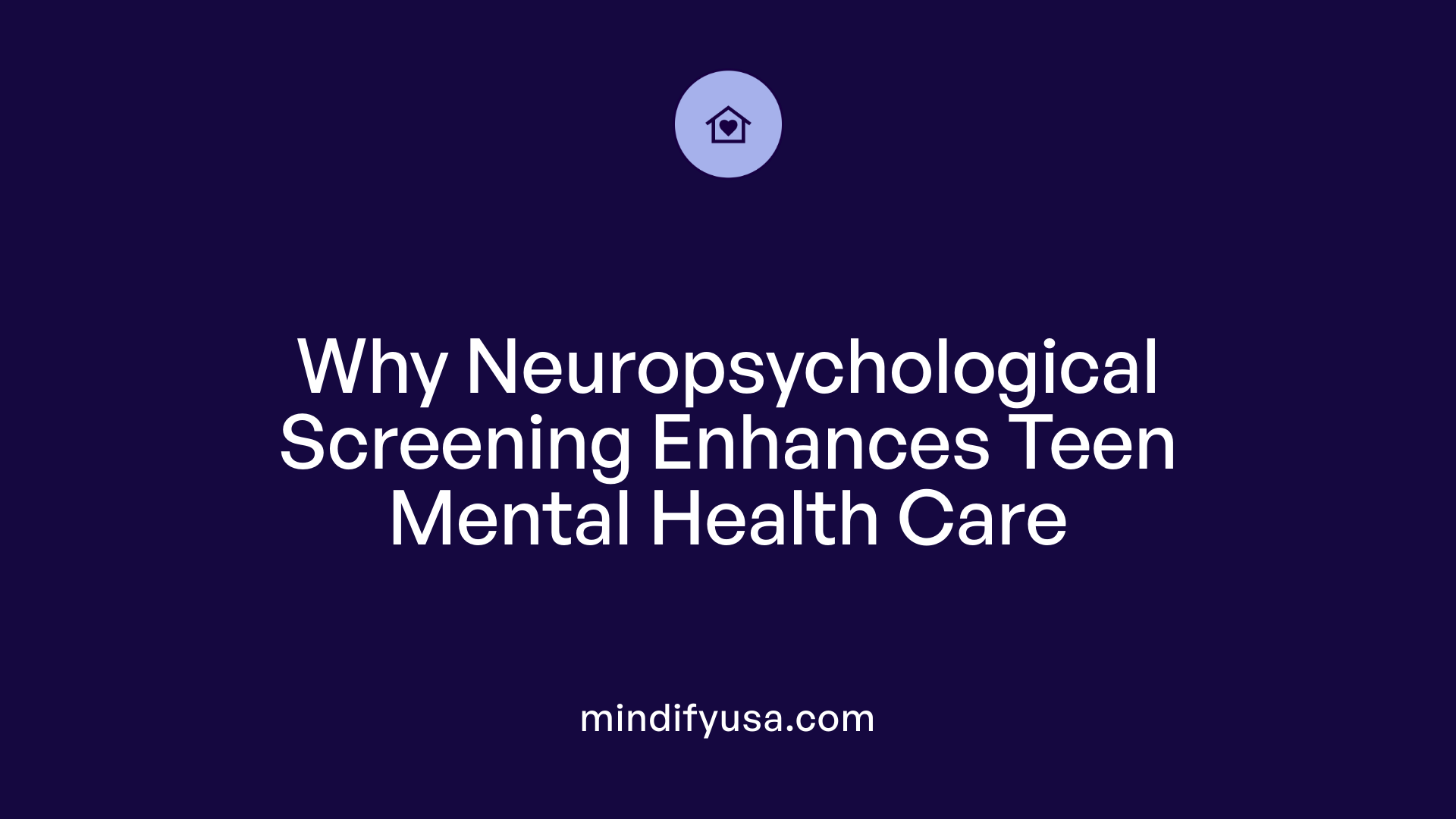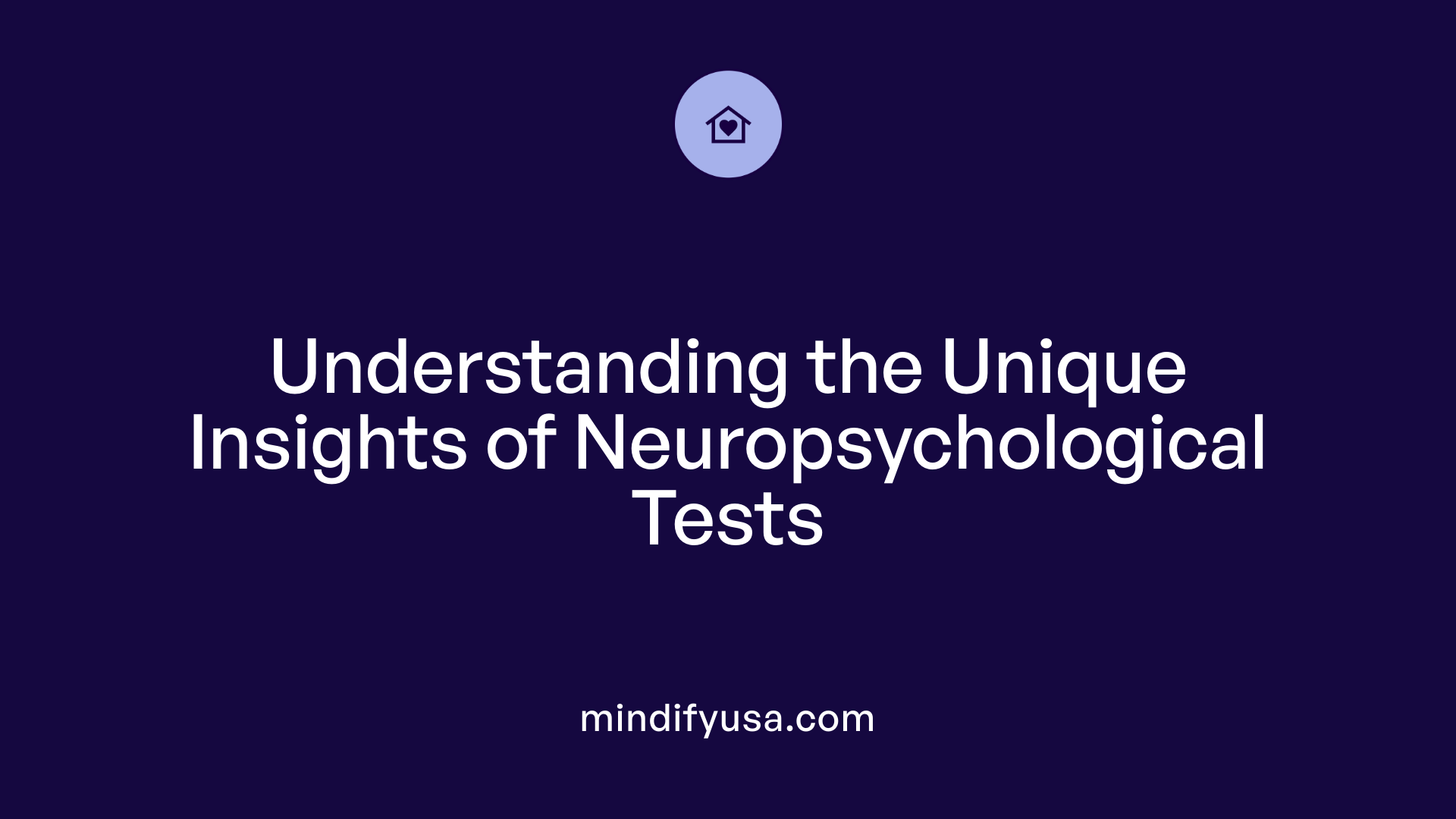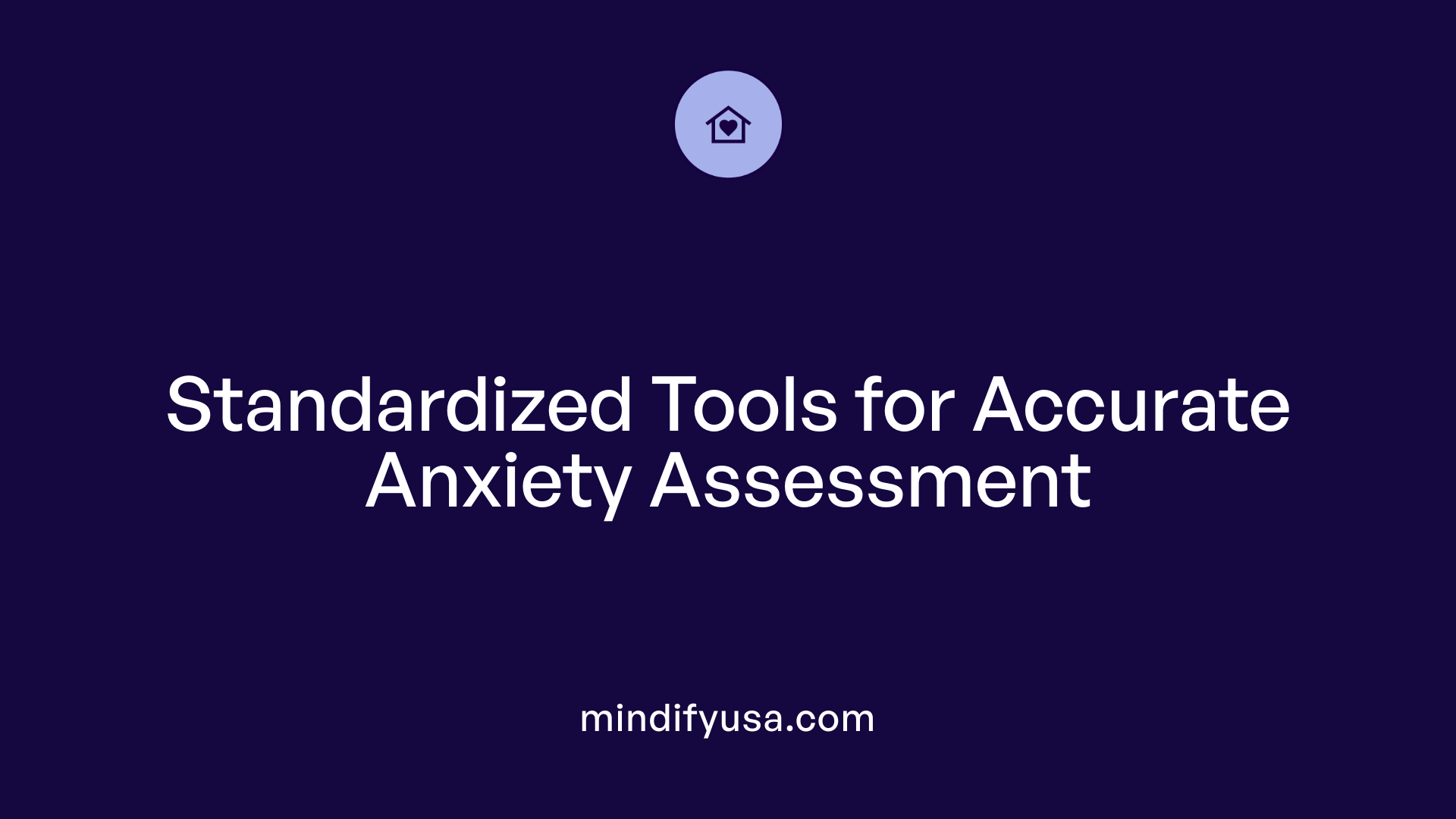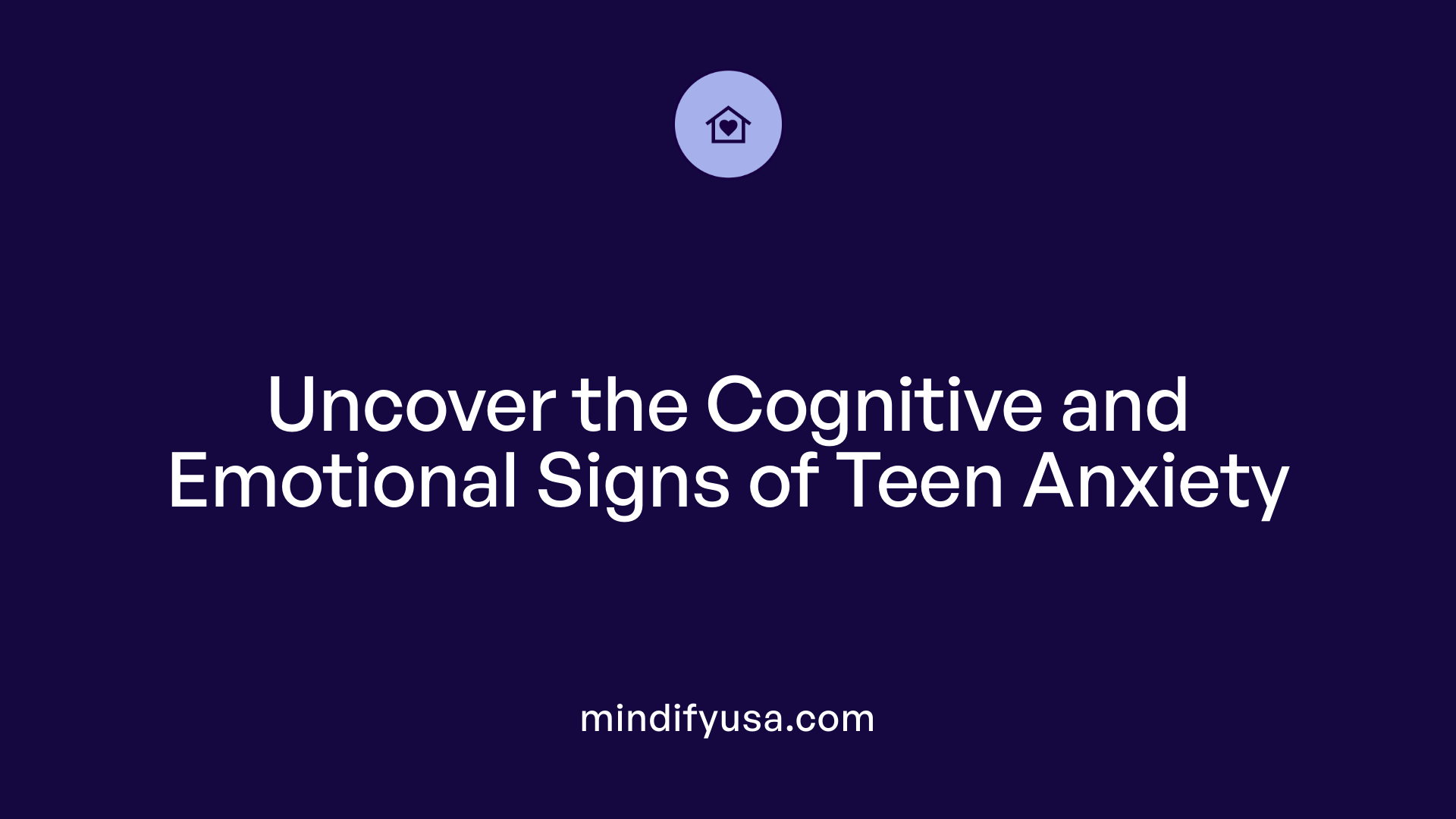Understanding the Role of Neuropsychological Screening in Adolescents
Teen anxiety is a common yet complex mental health concern that can significantly impact daily functioning, academic performance, and social interactions. To effectively address these challenges, healthcare providers often turn to neuropsychological screening. Such assessments delve into the intricate relationship between brain function, emotions, and behavior, offering valuable insights that guide personalized care strategies.
Purpose and Benefits of Neuropsychological Screening for Teen Anxiety

What is the purpose of neuropsychological screening in adolescents with anxiety?
Neuropsychological screening in teens aims to uncover patterns in thinking, emotions, and behavior that are linked to anxiety. This process involves detailed tests that evaluate various aspects of brain function, including attention, memory, reasoning, language, and social-emotional skills.
By performing these assessments, clinicians can create a clear profile of the adolescent's cognitive strengths and challenges. This helps in establishing a baseline, which is essential for designing personalized treatment plans. It also guides educational programs by identifying specific learning needs that may be affected by anxiety.
Furthermore, neuropsychological screening assists in differentiating anxiety from other mental health conditions like depression or learning disabilities. Regular monitoring through follow-up assessments can track changes over time, helping to evaluate if treatments are effective.
Overall, this type of evaluation offers comprehensive insights that improve overall care. It supports targeted interventions, customizes educational supports, and informs decisions about therapy or medication, ensuring the teen receives appropriate and effective support for their mental health challenges.
Procedures and Processes in Neuropsychological Screening for Teens
 Neuropsychological screening for teens involves a thorough and multidimensional process aimed at understanding how the adolescent’s brain functions across various domains. The procedures typically begin with the administration of standardized tests that measure cognitive abilities and behavioral tendencies. These tests evaluate crucial areas such as attention, memory, language skills, visuospatial reasoning, executive functions like planning and problem-solving, and motor skills. Many of these assessments are either paper-and-pencil or computerized, with tasks designed to be engaging yet rigorous, and results are scored based on how the teen performs compared to others of similar age and background.
Neuropsychological screening for teens involves a thorough and multidimensional process aimed at understanding how the adolescent’s brain functions across various domains. The procedures typically begin with the administration of standardized tests that measure cognitive abilities and behavioral tendencies. These tests evaluate crucial areas such as attention, memory, language skills, visuospatial reasoning, executive functions like planning and problem-solving, and motor skills. Many of these assessments are either paper-and-pencil or computerized, with tasks designed to be engaging yet rigorous, and results are scored based on how the teen performs compared to others of similar age and background.
In addition to formal testing, interviews with the teen and their caregivers are conducted to gather detailed personal, medical, and educational histories. These conversations help contextualize test results and identify concerns or noticeable changes in behavior or academic performance. Review of existing medical records, school reports, and previous assessments provides further background, ensuring an accurate and comprehensive understanding of the teen’s functioning.
Behavioral observations and contextual assessments are also vital components. These involve watching how the teen behaves during testing and in natural settings, offering insights into emotional regulation, social interactions, and daily functioning.
Preparation is an essential part of the process. Teens are advised to get a good night’s sleep, eat a nutritious breakfast, and take medications as usual if applicable. Bringing previous test results, reports, or relevant documentation can facilitate the assessment. Ultimately, the neuropsychologist synthesizes all these data points — test scores, interview insights, records, and behavioral observations — to identify cognitive strengths and weaknesses.
The interpretation of results helps clarify potential learning disabilities, attention issues, or emotional challenges such as anxiety or depression. This comprehensive evaluation informs diagnoses, treatment planning, and recommendations for educational accommodations, behavioral therapy, or further interventions. The entire process ensures a detailed and individualized understanding of the teen’s brain functioning, guiding effective support strategies.
Differentiating Neuropsychological Assessments From Other Evaluation Methods
 Neuropsychological assessments stand out from other mental health evaluations for teens because they focus specifically on how brain functions influence behavior and cognition. These tests are designed to measure a variety of cognitive domains, including memory, attention, language, problem-solving, and motor skills, providing a detailed profile of mental functioning.
Neuropsychological assessments stand out from other mental health evaluations for teens because they focus specifically on how brain functions influence behavior and cognition. These tests are designed to measure a variety of cognitive domains, including memory, attention, language, problem-solving, and motor skills, providing a detailed profile of mental functioning.
The assessment process is conducted by specialized neuropsychologists who are trained to administer and interpret standardized tests accurately. This expertise allows them to evaluate the intricate connections between brain activity and behavior, helping to identify specific neurological or developmental issues.
In comparison, traditional psychological assessments often focus more on emotional health, personality, and behavioral symptoms. They typically involve questionnaires, interviews, and observations aimed at diagnosing conditions like anxiety, depression, or conduct disorders. While helpful for understanding emotional and behavioral concerns, they do not delve as deeply into underlying cognitive or neurological functioning.
Neuropsychological testing is especially valuable when clinicians need to differentiate among neurological disorders (such as brain injury, epilepsy, or neurodegenerative diseases), developmental delays, and psychological conditions. It helps clarify the root causes of learning difficulties, attention problems, or behavioral challenges, guiding targeted treatment plans.
To summarize, neuropsychological assessments offer a comprehensive measurement of brain-based cognitive abilities, bridging neurology and psychology. They complement traditional evaluations by providing a detailed map of cognitive strengths and weaknesses, which can influence diagnosis, intervention, and educational planning.
Tools and Protocols for Evaluating Anxiety in Adolescents
 When assessing anxiety in teenagers, mental health professionals rely on a suite of standardized questionnaires and self-report measures designed to capture the severity and nature of anxiety symptoms.
When assessing anxiety in teenagers, mental health professionals rely on a suite of standardized questionnaires and self-report measures designed to capture the severity and nature of anxiety symptoms.
One of the most common tools is the Screen for Child Anxiety Related Disorders (SCARED), which consists of 41 questions that ask about feelings of worry, nervousness, and physical symptoms related to anxiety. It has versions for both parents and children, making it a versatile instrument for used in both clinical and school settings. Another widely employed measure is the GAD-7 (Generalized Anxiety Disorder 7-Item Scale), suited for adolescents aged 13-17. This brief, 7-question survey helps identify general anxiety disorder symptoms and gauge their impact.
The Spence Children’s Anxiety Scale is also popular. It features 45 items targeting various anxiety disorders, with versions appropriate for children as young as 6 and up to 18 years old. There is even a preschool version for children aged 3-6, ensuring wide developmental coverage.
In addition to these questionnaires, neuropsychologists incorporate cognitive and behavioral assessments like the WISC-V to evaluate related domains such as attention, executive function, and emotional regulation. These tests help illuminate how anxiety impacts overall brain functioning.
The assessment process often involves interviews with both the teen and caregivers, alongside behavior checklists and observational data. This comprehensive approach ensures that contextual factors influencing anxiety symptoms are captured.
Recently, digital technology has expanded the options for evaluation. Tele-neuropsychological (TeleNP) services allow for remote assessment utilizing secure platforms. These protocols adapt standardized tools for virtual administration, increasing access to evaluation especially during times when in-person visits are challenging.
In sum, effective evaluation combines validated questionnaires like SCARED, GAD-7, and the Spence Scale with cognitive testing, interviews, and observations, all carried out within strict ethical guidelines. This integrated approach ensures that assessments are sensitive, accurate, and culturally appropriate, providing a solid foundation for diagnosis and treatment planning.
The Impact of Neuropsychological Testing on Identifying and Addressing Anxiety

Can neuropsychological testing help identify and address anxiety in adolescents?
Yes, neuropsychological testing plays a valuable role in recognizing and managing anxiety among teens. These assessments evaluate a range of brain functions, including attention, memory, and emotional regulation, which are often affected in individuals with anxiety disorders.
Through standardized tests, clinicians can identify subtle cognitive deficits that may be linked to anxiety, such as difficulty concentrating, irritability, or heightened responses to emotional stimuli. The testing process includes questionnaires and interviews that explore emotional wellbeing alongside cognitive performance.
A significant benefit of neuropsychological evaluation is its ability to distinguish normal developmental behaviors from signs of clinical anxiety. For instance, occasional worry or separation anxiety may be typical during adolescence, but persistent or impairing anxiety suggests underlying issues that need targeted intervention.
The insight gained from these assessments helps develop personalized treatment strategies. Treatment plans may include cognitive-behavioral therapy, medication, or accommodations in school settings. The results also guide clinicians in understanding the specific emotional and cognitive factors contributing to anxiety, leading to more effective and tailored approaches.
In summary, neuropsychological tests provide a comprehensive picture of an adolescent's brain and emotional health, supporting early detection and intervention for anxiety disorders. This targeted approach promotes better mental health outcomes and equips teens with the tools needed to cope and thrive.
Harnessing Neuropsychological Insights for Better Outcomes
Neuropsychological screening offers a powerful tool for understanding the complex interplay between brain function and anxiety in teens. With detailed assessments that cover cognitive, emotional, and behavioral domains, clinicians can craft more targeted and effective treatment strategies. Combining these evaluations with evidence-based interventions like cognitive-behavioral therapy, medication, and supportive accommodations can significantly improve teens’ well-being and academic success. As research advances and assessment tools become more sophisticated, the potential for early detection and personalized care in adolescent anxiety continues to grow, promising brighter futures for youth at risk.
References
- Adolescent Psychological Testing In San Diego, California
- Mental Health: Neuropsychological Testing for Adolescents - ECCM
- Neuropsychological Testing: What It Is, Purpose & Procedure
- Recommendation: Anxiety in Children and Adolescents: Screening
- Neuropsychological Testing & Educational Evaluation
- Youth Mental Health Test - MHA Screening
- Anxiety and Stress in Teens | Johns Hopkins Medicine






































































































